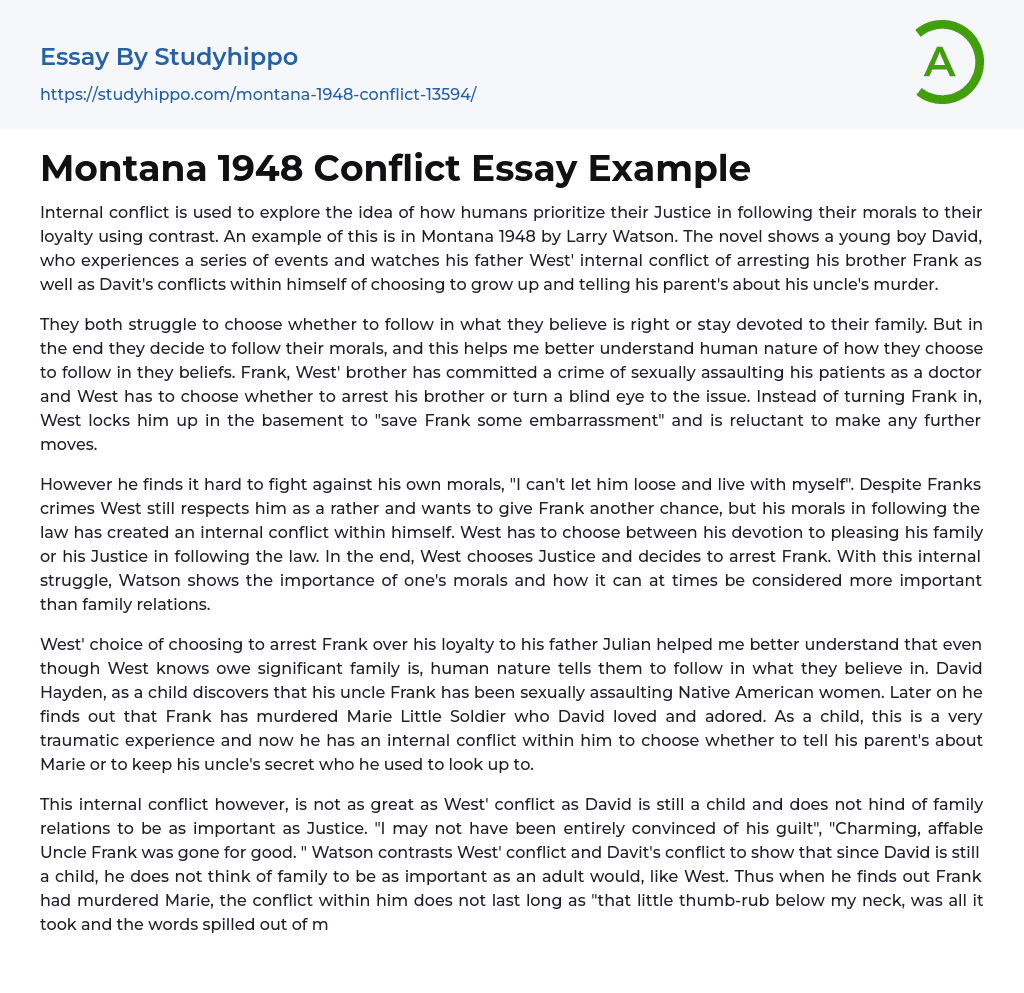The novel Montana 1948 by Larry Watson delves into the concept of internal conflict and its impact on the prioritization of justice and morals. The protagonist, David, witnesses his father's struggle as he grapples with the difficult choice to arrest his own brother, Frank. Simultaneously, David himself experiences inner conflicts as he is torn between growing up and informing his parents about his uncle's murder.
Both father and son are faced with a challenging decision — whether to adhere to their personal beliefs or remain loyal to their family. Ultimately, they opt for following their morals, shedding light on the intricate nature of human beings and how they make choices based on their convictions.
Frank, who happens to be West's brother, has committed an offense involving sexually assaulting his patients while working as a do
...ctor. West confronts the dilemma of either turning a blind eye to this situation or arresting his own brother. In an attempt to spare Frank from embarrassment, West locks him up in the basement but finds himself grappling internally. He confesses that he cannot allow Frank to go free without compromising his own conscience.
Despite Frank's actions, West still holds respect for him as a brother and wishes to offer him another chance. However, being committed to upholding the law creates an internal conflict within West as he must choose between pleasing his family or seeking justice. Ultimately, West decides to prioritize justice over familial loyalty and proceeds with arresting Frank.
This internal struggle emphasizes the importance of morals and how they can sometimes be more significant than family relationships. West's decision to apprehend Frank, despite his loyalty to his
father Julian, made me realize that even though West understands the value of family, human nature drives individuals to follow their own beliefs.
As a child, David Hayden discovers that his uncle Frank has been sexually assaulting Native American women. Later on, he also learns that Frank has murdered Marie Little Soldier, someone whom David deeply admired and cherished. This traumatic experience leads to an internal conflict for David as he debates whether to reveal Marie's fate to his parents or keep his uncle's secret, whom he once idolized.
Although David experiences this inner turmoil, it is not as significant as West's predicament. Being a child, David does not hold familial relations in the same regard as an adult would like West does. Therefore, when David becomes aware of Frank's murderous actions towards Marie, his inner conflict quickly fades away with just "that little thumb-rub below my neck" before the words pour out from him.
Watson explains that the notion of human age affects the significance we place on our beliefs. While West considers loyalty towards family equally important as obeying the law, David prioritizes justice over familial loyalty. Unlike West, he does not feel obligated to stay loyal to his familyDavid's decision to reveal Frank's crime to his parents is motivated by his personal affection for Marie, regardless of their relationship or social status. This illustrates how as one grows older, matters tend to become more complicated, as seen in David's struggle to determine what is right and whether he should embrace adulthood or cling onto his childish nature.
In the beginning of the novel, David's innocence is apparent when he feels pressured to please Frank and Gloria
due to their lack of children. Even after discovering Frank's crime, David's immaturity emerges as he cries himself to sleep, fearing that he will never see his horse, Nutty, again.
After Frank dies, David experiences a sense of satisfaction, believing that it resolved all their problems. However, as the story progresses, David begins to mature. The text demonstrates how Watson effectively uses contrast to portray David's growth and independence. This is demonstrated through his realization of his mother's flaws and his desire to protect her.
Through the revelation of truth, David is compelled to confront the harsh realities of the world which leads him towards maturity and experiencing adulthood. Consequently, Watson suggests that traumatic events can accelerate a child's development and expose them to adult responsibilities.
The contrast also reveals that individuals have varying levels of maturity which can be influenced by societal experiences.Watson uses contrast in Montana 1948 to depict the challenges that West and David encounter. The moral dilemma faced by West, torn between upholding the law or staying loyal to Julian, emphasizes how personal values outweigh family allegiance. Likewise, David's struggle with whether or not to reveal Frank's murder showcases how age impacts one's priorities, ultimately suggesting that societal influences can mold a child's level of maturity.
- Home essays
- Dog essays
- Adoption essays
- Babies essays
- Children essays
- Love essays
- Parenting Teens essays
- Wedding essays
- Wife essays
- Aunt essays
- Daughter essays
- Parents essays
- Sister essays
- Foster Care essays
- Sibling essays
- Father essays
- Grandparent essays
- Mother essays
- Caring essays
- Dysfunctional Family essays
- Bedroom essays
- Room essays
- Relationship essays
- Jealousy essays
- Friends essays
- Online Dating essays
- Divorce essays
- Husband essays
- Marriage essays
- Hometown essays
- Parenting essays
- Family Tradition essays
- Family Values essays
- Baby Clothes essays
- Child essays
- Childcare essays
- Child labor essays
- Doll essays
- Walls essays
- Appreciation essays
- Single Parent essays
- Single Parenting essays
- Adaptation essays
- Adventure essays
- Adversity essays
- Aging essays
- Alcohol essays
- Barbie Doll essays
- Beauty essays
- Care essays




